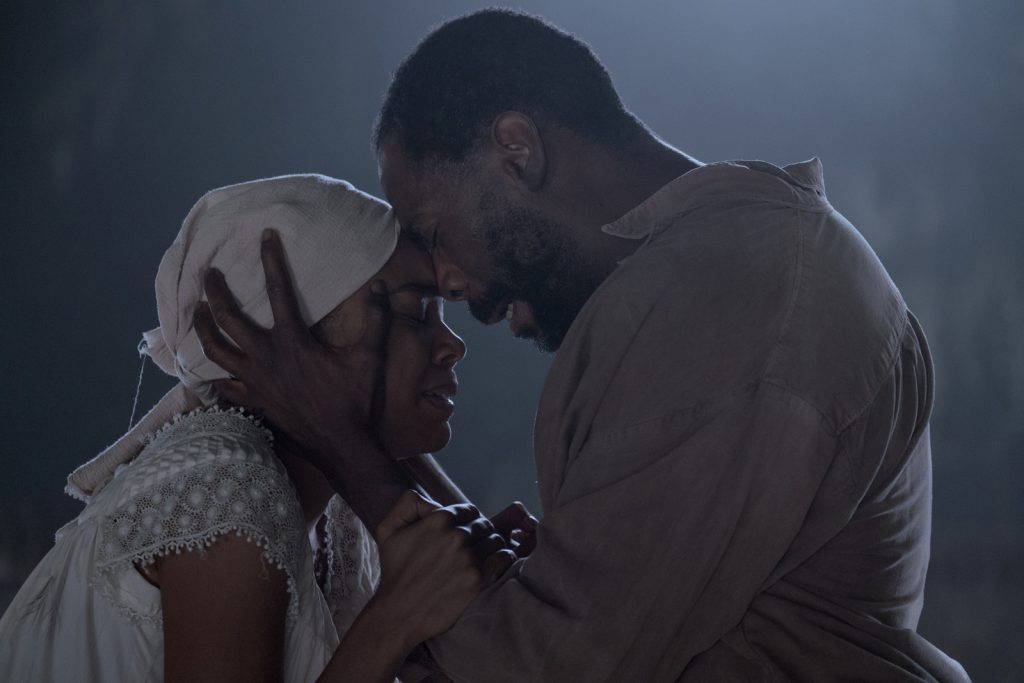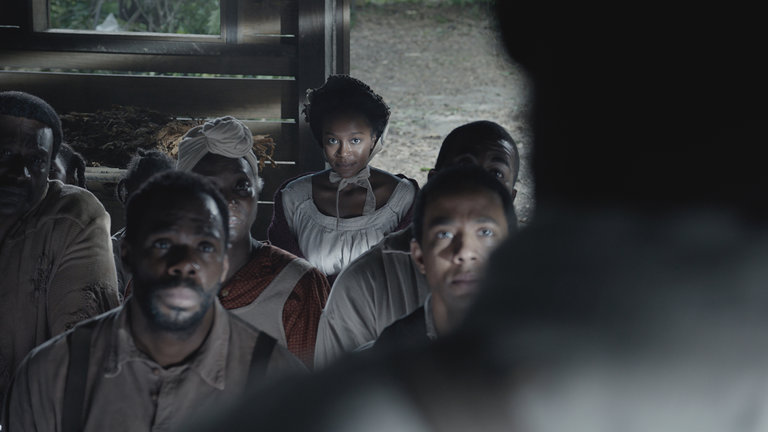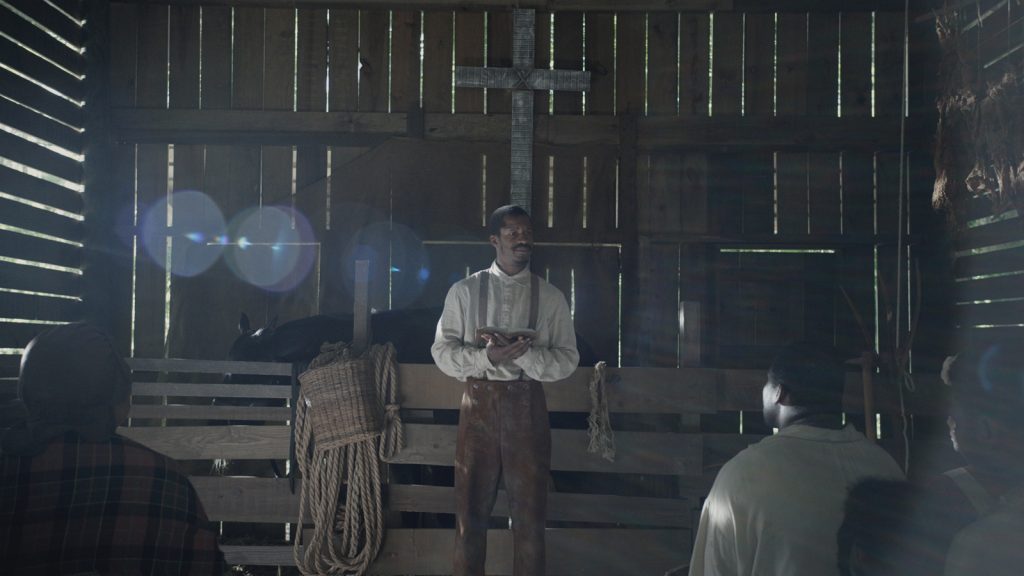 Title: The Birth of a Nation | Rated: R | Runtime: 120 min | Theaters nationwide
Title: The Birth of a Nation | Rated: R | Runtime: 120 min | Theaters nationwide
Perhaps no one ever thought about it, but this was a prime time for a film to really take the fight to D.W. Griffith’s 1915 silent epic The Birth of a Nation. Griffith’s most recognized picture – which screened at the White House in front of President Woodrow Wilson – bears a controversial and mixed legacy; though rightfully lauded for its innovations in filmmaking techniques, it’s also rightfully criticized for its vile, racist story. Over 100 years have passed, and during this time, we’ve witnessed the Civil Rights Movement, the election of the nation’s first African-American president, and the rise of Black Lives Matter, to name a few. Now, actor/writer/director/producer Nate Parker has taken that very film’s name and delightfully subverted it with his own feature … which too has mired in controversy that threatens to overwhelm it. Chances are, you’ve likely come across many an article and op-ed about the film and the circumstances surrounding it. The resulting conversation has brought into question whether art can be separated from the artist, and whether our principles should outweigh our engagement with art. Parker’s The Birth of a Nation is difficult to assess, and to be completely honest, I’m having trouble writing this. But write I shall, and as you read further, you may find that this isn’t so much a review as much as it is a collection of thoughts about how the film engaged me and how I responded to it.
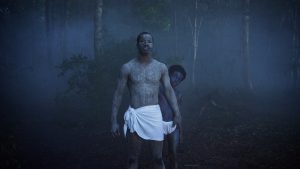 In 1809 Southampton county, Virginia, young Nat Turner (Tony Espinosa) lives as a slave with his family under the Turner family. One day after playing, Nat sees an unattended book and – his curiosity piqued – steals it in an effort to learn how to read. His inquisitive nature catches the attention of Turner matriarch Elizabeth (Penelope Ann Miller), who brings him into their home and teaches him how to read the Bible. Though he is later sent into the cotton fields to work, Nat becomes a preacher in his adulthood. His financially strapped childhood friend turned master Samuel (Armie Hammer) accepts offers to send Nat (Parker) to local plantations, where his preaching can subdue increasingly unruly slaves. As he witnesses the atrocities and injustice being committed against himself, his family, and his fellow slaves, Nat becomes compelled to instigate a bloody, violent uprising in order to bring freedom for them all.
In 1809 Southampton county, Virginia, young Nat Turner (Tony Espinosa) lives as a slave with his family under the Turner family. One day after playing, Nat sees an unattended book and – his curiosity piqued – steals it in an effort to learn how to read. His inquisitive nature catches the attention of Turner matriarch Elizabeth (Penelope Ann Miller), who brings him into their home and teaches him how to read the Bible. Though he is later sent into the cotton fields to work, Nat becomes a preacher in his adulthood. His financially strapped childhood friend turned master Samuel (Armie Hammer) accepts offers to send Nat (Parker) to local plantations, where his preaching can subdue increasingly unruly slaves. As he witnesses the atrocities and injustice being committed against himself, his family, and his fellow slaves, Nat becomes compelled to instigate a bloody, violent uprising in order to bring freedom for them all.
This is Parker’s first time writing and directing a feature-length film, and it clearly shows, though we can also see inklings of his talents behind the camera. Select dialogue can be too on the nose, and the film has its share of very corny and overly sentimental images, perhaps most typified by the film’s unfortunate final frame. However, Parker is certainly capable of composing emotionally resonant scenes, whether it be a joyful and tender wedding of Nat’s friends Hark (Colman Domingo) and Esther (Gabrielle Union) or a gut-wrenching moment where a hapless slave is force-fed. Needless to say, the film’s first and second acts hold up much better than its third, which covers the buildup to the rebellion and the uprising itself. In this buildup, there are four events that push Nat closer and closer to the edge, but they’re awkwardly ordered since the most hard-hitting one comes first and the subsequent ones feel progressively less powerful. Then again, it does take some sting out of the limp climax, which surprisingly rushes through the rebellion in the span of what feels like 10 minutes. Perhaps this is a result of Parker and his crew working with a tight budget, but even then, you’d think that of all the scenes in the film, this is what should been of utmost priority to perfect, and it’s far from that.
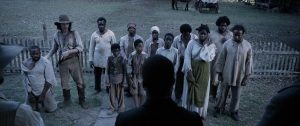 What’s most riveting about the film is its plethora of compelling ideas and themes, even though Parker doesn’t develop some as much as he could have. While the use of Christianity to both subjugate and liberate isn’t new material for films featuring slavery, it’s keenly felt here because Nat is directly engaging in it. To watch him being forced to twist his beliefs to subdue his fellow slaves and also using it to point to their freedom is an utterly fascinating experience. This, of course, leads to the development of several interesting dichotomies at play: that which highlights the differences in which plantation owners and slaves treat religion, and that between love and wrath. Also mesmerizing is the influence of African tribal ancestry and prophecy on Nat’s life, though it’s brought up only in dream sequences and thus doesn’t have the time to comfortably settle in the story, which goes to show how much material that Parker juggles. Case in point: to see Nat and Samuel’s relationship progress from friendship to master-slave would be nothing short of captivating, but there’s hardly room for it to grow here.
What’s most riveting about the film is its plethora of compelling ideas and themes, even though Parker doesn’t develop some as much as he could have. While the use of Christianity to both subjugate and liberate isn’t new material for films featuring slavery, it’s keenly felt here because Nat is directly engaging in it. To watch him being forced to twist his beliefs to subdue his fellow slaves and also using it to point to their freedom is an utterly fascinating experience. This, of course, leads to the development of several interesting dichotomies at play: that which highlights the differences in which plantation owners and slaves treat religion, and that between love and wrath. Also mesmerizing is the influence of African tribal ancestry and prophecy on Nat’s life, though it’s brought up only in dream sequences and thus doesn’t have the time to comfortably settle in the story, which goes to show how much material that Parker juggles. Case in point: to see Nat and Samuel’s relationship progress from friendship to master-slave would be nothing short of captivating, but there’s hardly room for it to grow here.
Many have taken issue with the fact that the film is a largely fictional dramatization of true events rather than a historically accurate retelling of said events. While I do believe that the film should have opened with a “This is a dramatization of true events” disclaimer or something similar, I must admit that otherwise, I’m not too bothered by this. I’ve long held the opinion that no one should ever take actual events-based films at face value as facts, and that for such films, the stories that the filmmakers want to tell is what matters most. Exceptions to that position can certainly be made depending on how familiar I am with the subject matter prior to watching the film; for example, I had a lukewarm reaction to Lone Survivor because filmmaker Peter Berg excised the most compelling part about Operation Red Wings – which I read about in an article years before the film’s release – in favor of a fictional climax. Admittedly, my knowledge of Nat was minimal going into this film, and since watching it, I’ve had an enlightening time reading articles that separate truth and fiction in regards to this – which is what films like The Birth of a Nation should inspire viewers to do.
 That being said, instead of questioning Parker’s decisions to sacrifice historical accuracy, I ask, “Do the majority of decisions service the story well?” and “Is this a story worth telling?” For me, the answer is yes … to a fault, which I shall address momentarily. Simmering with righteous anger before exploding, the film brings to mind the various race-related issues we’ve encountered in the past few years, specifically ones that lead to looting and riots. Yes, Parker constructs incidents that didn’t actually occur, but what’s important is how each of them – tragic in their own ways – have a hand in and lead to the rebellion, mirroring how today, the unfortunately long string of deaths and murders of black people can cause the already growing anger of their communities to boil over. There’s also Parker’s clear reverence toward Nat, as he constantly frames and portrays him as a Christ-like figure. There’s no doubt that many will have an issue with this, especially when you take into account how the film downplays or excises some of the revolt’s disturbing turns. You can certainly call the story irresponsible, but what ultimately matters is whether you understand why Nat and his fellow slaves engage in such activities, and why Parker sees Nat as a hero – as such an understanding can be enhanced all the more by framing it within the context of what’s happening in our own world. Cinema, after all, tends to be a reflection of the time when it is made, and so it is for this film. Is there a more compelling way to tell Nat’s story? Sure, but I don’t think that takes much away from Parker’s version, which is worth telling and holds up fairly well … at least, until we get to the film’s most egregious storytelling choice.
That being said, instead of questioning Parker’s decisions to sacrifice historical accuracy, I ask, “Do the majority of decisions service the story well?” and “Is this a story worth telling?” For me, the answer is yes … to a fault, which I shall address momentarily. Simmering with righteous anger before exploding, the film brings to mind the various race-related issues we’ve encountered in the past few years, specifically ones that lead to looting and riots. Yes, Parker constructs incidents that didn’t actually occur, but what’s important is how each of them – tragic in their own ways – have a hand in and lead to the rebellion, mirroring how today, the unfortunately long string of deaths and murders of black people can cause the already growing anger of their communities to boil over. There’s also Parker’s clear reverence toward Nat, as he constantly frames and portrays him as a Christ-like figure. There’s no doubt that many will have an issue with this, especially when you take into account how the film downplays or excises some of the revolt’s disturbing turns. You can certainly call the story irresponsible, but what ultimately matters is whether you understand why Nat and his fellow slaves engage in such activities, and why Parker sees Nat as a hero – as such an understanding can be enhanced all the more by framing it within the context of what’s happening in our own world. Cinema, after all, tends to be a reflection of the time when it is made, and so it is for this film. Is there a more compelling way to tell Nat’s story? Sure, but I don’t think that takes much away from Parker’s version, which is worth telling and holds up fairly well … at least, until we get to the film’s most egregious storytelling choice.
The Birth of a Nation uses its black female characters poorly. Even when you move past the fact that they’re slaves and thus already in terrible circumstances, it’s appalling how they’re treated by both the white characters and – shockingly – the black male characters. Whether it be Nat’s wife Cherry (Aja Naomi King), his mother Nancy (Aunjanue Ellis), his grandmother Bridget (Esther Scott), or Esther, each of them are portrayed as either objects of sexual desire or submissive characters whose purpose is to affirm or prop up the black men. Realizing that all of them are drawn this way left a sour taste in my mouth, and aggravating it are the allegations of harassment and rape levied against Parker and Jean Celestin, who co-wrote the story with Parker. As much as I tend to believe in and practice the separation of art from the artist (the fact that Roman Polanski pleaded guilty to unlawful sexual intercourse with a minor doesn’t change my opinion that The Pianist is a masterpiece), I just could not for this picture because the allegations kept coming to mind. Granted, I don’t know all of the details and the context of the case against Parker (who was acquitted), so I’m not willing to fully judge him nor speak out about the case just yet. However, regardless of whether or not he committed harassment and rape, one thing is certain: to thinly draw Bridget, Cherry, Esther, and Nancy is a dreadful storytelling choice, made all the more troubling by the allegations surrounding Celestin and Parker.
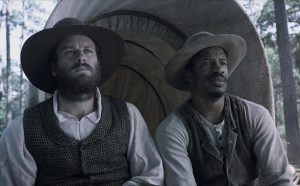 Taking advantage of a committed cast, the film features a host of strong performances driven by emotions told and untold. Love him or hate him, Parker is tremendous in the lead role, and it truly is a believable and multifaceted turn from him. Though Hammer is understated in comparison, his body language speaks volumes about Samuel’s feelings. Ellis, King, and Scott deserve special mention here; they shine despite operating with limited characters, and it’s due to their emotionally grounded work – full of heart and soul – that Nancy, Cherry, and Bridget not only feel like natural parts of this world, but are memorable in their own right. Ditto for Union, who has no speaking lines whatsoever, but knocks her scenes out of the park armed with just pure emotional expression. Miller brings a gentleness to Elizabeth, and Domingo proves to be devastating in his few yet key scenes. Also among the great performances is Jackie Earle Haley, who is repulsive as slave hunter Raymond Cobb.
Taking advantage of a committed cast, the film features a host of strong performances driven by emotions told and untold. Love him or hate him, Parker is tremendous in the lead role, and it truly is a believable and multifaceted turn from him. Though Hammer is understated in comparison, his body language speaks volumes about Samuel’s feelings. Ellis, King, and Scott deserve special mention here; they shine despite operating with limited characters, and it’s due to their emotionally grounded work – full of heart and soul – that Nancy, Cherry, and Bridget not only feel like natural parts of this world, but are memorable in their own right. Ditto for Union, who has no speaking lines whatsoever, but knocks her scenes out of the park armed with just pure emotional expression. Miller brings a gentleness to Elizabeth, and Domingo proves to be devastating in his few yet key scenes. Also among the great performances is Jackie Earle Haley, who is repulsive as slave hunter Raymond Cobb.
There’s no doubt that this is a carefully and lovingly crafted picture, meant to impart the harsh reality of slavery in whatever ways it can. Cinematographer Elliot Davis captures plenty of evocative and striking images and sequences, such as a white girl and black girl playing together – an innocuous moment if it weren’t for the fact that the former tugs at a rope tied around the latter’s neck. The makeup work is top-notch, as swollen faces and bloody wounds from the lashes of whips communicate the cruelty inflicted on the slaves by the plantation owners and enforcers. The use of classic songs like “Swing Low Sweet Chariot” and Nina Simone’s “Strange Fruit” play over images to great emotional effect.
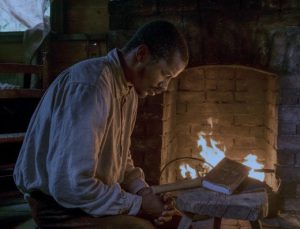 Should you watch The Birth of a Nation? Honestly, I can’t say because it depends on you – specifically your tastes and values. If you refuse to watch the film out of principle because of the allegations against Parker and Celestin, that’s fine, and you’re not alone. If you want to watch the film because you support black artists in the film industry, then that’s fine too. If all you care about is the film itself, then by all means, go with your intuition. If you ask me, there is no right or wrong way to go about a film as controversial as this one; the only opinion that matters is your own, whatever you choose to do. I can only write about my own reaction to the film, and what I can say is, while Parker’s film certainly has its share of merits, its effect is curbed by clumsy storytelling, a rushed third act, and the disconcerting treatment of black female characters.
Should you watch The Birth of a Nation? Honestly, I can’t say because it depends on you – specifically your tastes and values. If you refuse to watch the film out of principle because of the allegations against Parker and Celestin, that’s fine, and you’re not alone. If you want to watch the film because you support black artists in the film industry, then that’s fine too. If all you care about is the film itself, then by all means, go with your intuition. If you ask me, there is no right or wrong way to go about a film as controversial as this one; the only opinion that matters is your own, whatever you choose to do. I can only write about my own reaction to the film, and what I can say is, while Parker’s film certainly has its share of merits, its effect is curbed by clumsy storytelling, a rushed third act, and the disconcerting treatment of black female characters.
Rating: 3.0/5.0
* Photos courtesy of Fox Searchlight Pictures

